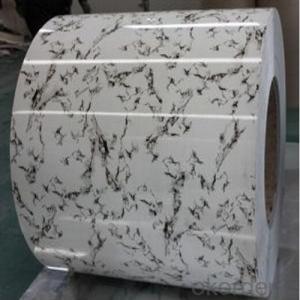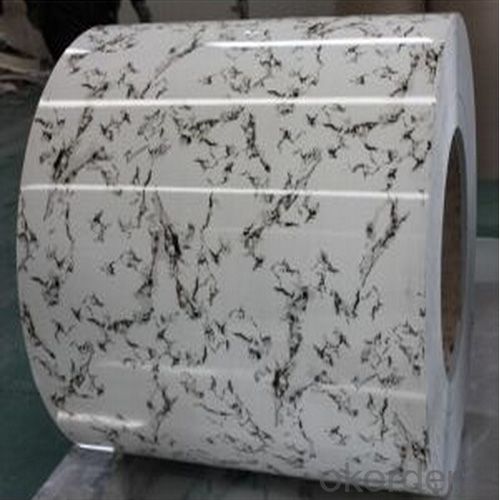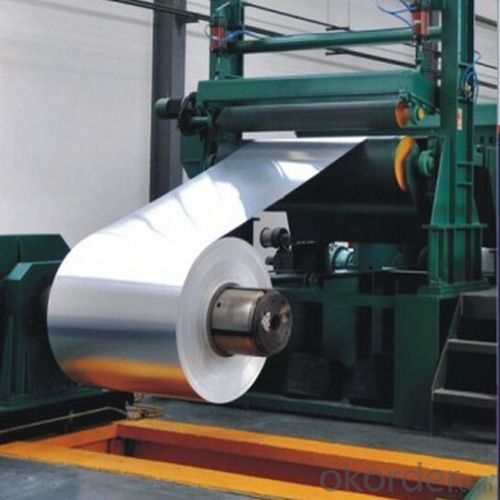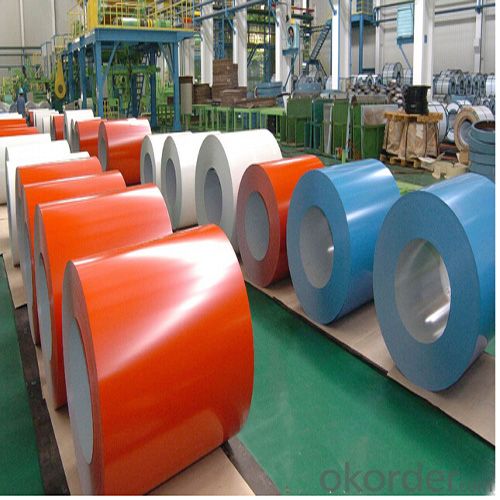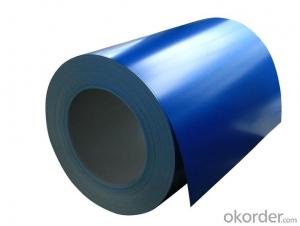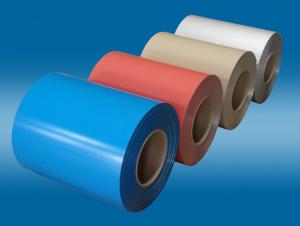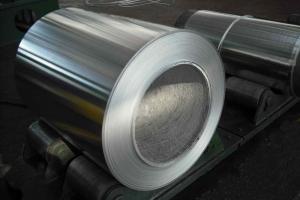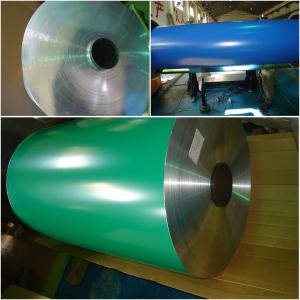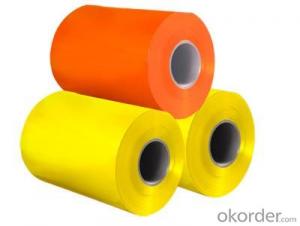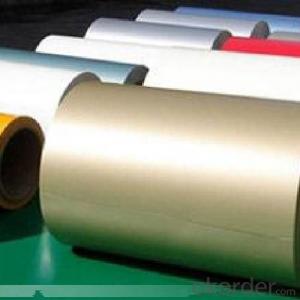Coil Coated Aluminum Sheet for Exterior Decorations Curtain Wall Stone Prepainted Aluminum Coils
- Loading Port:
- Shanghai
- Payment Terms:
- TT OR LC
- Min Order Qty:
- 5 m.t
- Supply Capability:
- 10000 m.t/month
OKorder Service Pledge
OKorder Financial Service
You Might Also Like
Specification
1.Structure of Decorations Curtain Wall Stone Prepainted Aluminum Coils Description:
Curtain Wall Stone Prepainted Aluminum Coils is Mainly used in signs, billboards, building exterior decoration, bus body, high-rise buildings and factories wall decoration, kitchen sink, lamp, fan leaves, with pieces of electronic, chemical equipment, sheet metal processing parts, deep drawing or spinning hollowware, welding parts, heat exchangers, bell surface and disk, plate, kitchenware, decorations, reflective devices, ect。Quality of material: totally free from defects like white rust, oil patches, roll marks, edge damage, camber, dents, holes, break lines, scratches and free from coil set
2.Main Features of Decorations Curtain Wall Stone Prepainted Aluminum Coils:
Good Corrosion Resistance
Good Machinability
High Quality
Competitive Price
3. Decorations Curtain Wall Stone Prepainted Aluminum Coils Images:
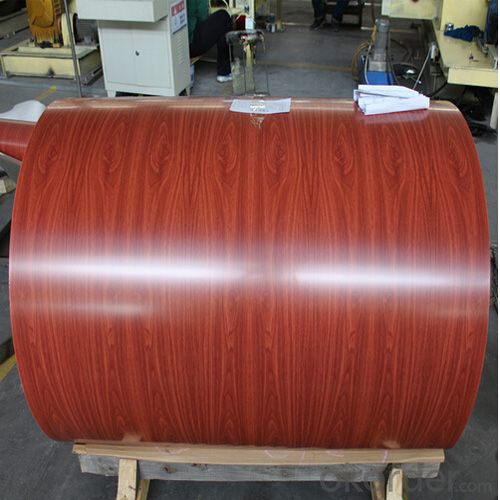
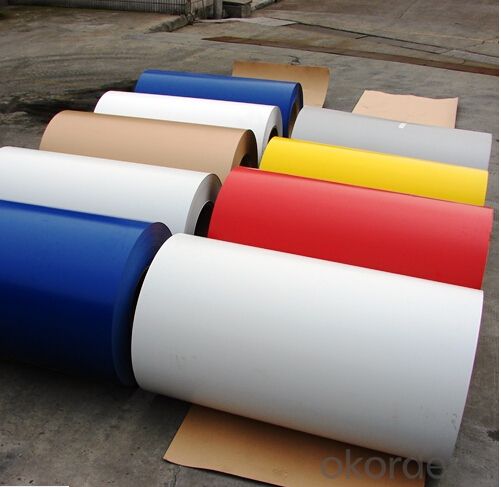
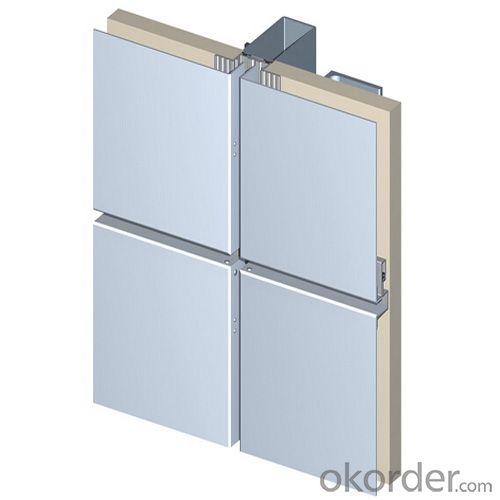
4. Decorations Curtain Wall Stone Prepainted Aluminum Coils Specification:
| Alloy No. | Thickness (mm) | Width (mm) | Temper | |
| A1050,A1060, A1070,A1100,A1235,A1245 | 0.2-3.0 | 20-1900 | O,H12,H22,H14,H24,H16,H26,H18 | |
| 4.0-12.0 | 1000-1900 | H111,H112 | ||
| A3003,A3004,A3105 | 0.2-4.0 | 20-1900 | O,H12,H22,H14,H24,H16,H26,H18 | |
| 4.0-12.0 | 1000-1900 | H111,H112 | ||
| A5052,A5083,A5754,A5005 | 0.2-4.0 | 20-1900 | O,H12,H22,H14,H24,H16,H26,H18 | |
| 4.0-12.0 | 1000-1900 | H111,H112 | ||
| A6061,A6082,A6063 | 0.8-3.0 | 20-1900 | O | |
| A8011,A1145,A1235 | 0.005-0.2 | 20-1700 | O,,H18,H24 | |
| ID | 76mm,152mm,200mm,300mm,505mm | |||
5.FAQ
Q1.How long have you been in this product?
A1:More than 10 years.
Q2. What's the minium quantity(MOQ)?
A2. 5 Metric tons
Q3. How long is shipping time?
A3. 7 (ready-made products)-25 days(OEM)
Q4. How do you guarantee the quality?
A4. 1. Cooperating and Exchaning experience with sevral quoted aluminum companies
2. Japanese and Swiss production line and skilled works (regular training and testing)
3. more than 10 years production experience.
Q5. Do you have after sale service?
A5. Yes. Any quality problem occurs within one year, pls take photoes,we will be responsible.
- Q: What is the maximum width-to-thickness ratio for aluminum coils?
- The maximum width-to-thickness ratio for aluminum coils depends on various factors, including the specific alloy, temper, and intended application. Aluminum coils are commonly used in industries such as construction, automotive, and packaging, where different width-to-thickness ratios may be required. In general, the width-to-thickness ratio for aluminum coils typically ranges between 100:1 to 200:1. However, it is important to note that this range can vary based on the specific alloy and temper. Thicker coils may have a lower width-to-thickness ratio, while thinner coils can have a higher ratio. High-strength alloys, such as those used in aerospace applications, may have lower width-to-thickness ratios due to their increased strength requirements. Conversely, coils used in less demanding applications may have higher width-to-thickness ratios. It is crucial to consult the relevant industry standards, specifications, or manufacturer guidelines to determine the appropriate width-to-thickness ratio for a specific aluminum coil. These guidelines consider the intended use, mechanical properties, and performance requirements, ensuring that the coil is suitable for its intended application while maintaining structural integrity and functionality.
- Q: Can aluminum coils be utilized as a material for crafting jewelry?
- <p>Yes, aluminum coils can be used for making jewelry. Aluminum is a lightweight, durable, and affordable metal that is often used in costume jewelry and for decorative purposes. It can be easily shaped, bent, and manipulated into various forms, making it suitable for creating intricate designs. However, it's important to note that aluminum is a softer metal and may not be as durable as other metals like stainless steel or silver, so it may not be ideal for pieces that will be worn daily or subjected to significant wear and tear.</p>
- Q: i have about 100lbs of aluminum blocks and scrap.
- WOW.......they must be worth sum money. Lucky you!!!!!!
- Q: Can aluminum coils be used in the production of aluminum ceilings?
- Yes, aluminum coils can be used in the production of aluminum ceilings. The coils are typically processed and shaped into sheets, which are then used to create the ceiling panels.
- Q: I live in blue ridge ga and have about 2,000 aluminum cans and would like to know how much I can get for them.
- The price for scrap aluminum cans varies litteraly every day. Within the last year, it has been between about 28 cents and 50 cents a pound. The last price I saw for clean, flattened cans delivered to the dealer was about 42 cents. As I said, it could be a bit higher or lower than that now. There are about 30-32 cans per pound of aluminum, so your 2,000 cans probably weigh around 64 pounds and could be worth about $27, assuming there has been no big change in the price recently. But that's a delivered price. If you have to drive 10 miles each way and your truck gets 20 mpg, you will be paying for a gallon of gas. If it is 30 miles each way (60 miles total), you are looking at 3 gallons of gas, which is probably about $8, leaving you a profit of around $19, or maybe a little less. That's with some optimistic assumptions, and it doesn't include the cost of big plastic bags to carry the cans. Not very encouraging, is it? Recycling makes sense for a big city or a recycling center, where they can get thousands of cans a day. But it is hard for an individual to make any money at it. i know this is not what you wanted to hear, but I hope it is helpful anyway.
- Q: What are the common surface repair methods for aluminum coils?
- Common surface repair methods for aluminum coils include sanding, buffing, and polishing. Sanding is used to remove surface imperfections and smooth out any rough areas. Buffing involves using a buffing wheel and compound to restore the shine and luster of the aluminum surface. Polishing is done using a polishing compound or aluminum polish to further enhance the appearance and create a protective barrier against corrosion.
- Q: Can aluminum coils be used in heat exchangers?
- Yes, aluminum coils can be used in heat exchangers. Aluminum is a popular choice for heat exchangers due to its excellent thermal conductivity and corrosion resistance. The high thermal conductivity of aluminum allows for efficient heat transfer, making it an ideal material for heat exchangers. Additionally, aluminum's corrosion resistance ensures that the coils will remain durable and functional even in harsh environments.
- Q: I wrap everything with aluminum foil and bake it in the oven -- fish, meat, vegetables. Is this really safe? Or safe when done occasionally? Or should I find a new way?
- I use aluminium foil often for baking however I use baking paper between the food and the foil. I am sure it is safe to use foil, however I find that on occasions the foil sticks to the food, so I use the non stick paper between. I hope this helps.
- Q: How are aluminum coils processed and fabricated?
- Aluminum coils are processed and fabricated through a series of steps. First, the raw aluminum is rolled into thin sheets and then coiled. These coils are then cleaned and treated to remove any impurities or contaminants. Next, the coils are heated and passed through a series of rollers to achieve the desired thickness and shape. This process, known as cold rolling, helps to enhance the strength and durability of the aluminum. After cold rolling, the coils may undergo further treatments such as annealing or tempering to increase their flexibility or hardness. Finally, the coils are cut, shaped, and fabricated into various products like cans, automotive parts, or building materials using techniques like stamping, bending, or welding.
- Q: Can aluminum coils be embossed or textured?
- Aluminum coils possess the capability to undergo embossing or texturing, thereby enabling the creation of patterns or designs on their surface. This can be achieved through mechanical or chemical processes. The resulting embossed or textured surface not only enhances the visual appeal but also improves the functionality of the aluminum coil, by augmenting its grip or minimizing glare. Consequently, these aluminum coils, with their embossed or textured features, have found widespread utilization across industries like construction, automotive, and packaging.
Send your message to us
Coil Coated Aluminum Sheet for Exterior Decorations Curtain Wall Stone Prepainted Aluminum Coils
- Loading Port:
- Shanghai
- Payment Terms:
- TT OR LC
- Min Order Qty:
- 5 m.t
- Supply Capability:
- 10000 m.t/month
OKorder Service Pledge
OKorder Financial Service
Similar products
Hot products
Hot Searches
Related keywords
